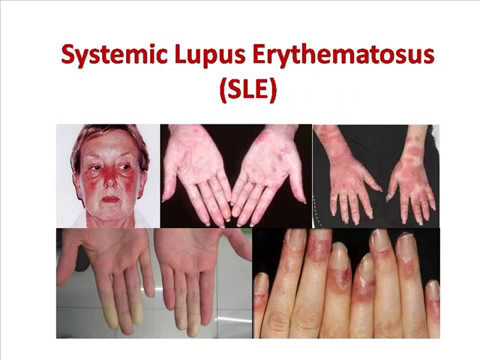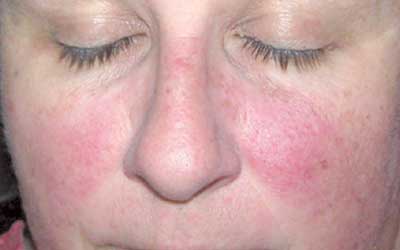Systemic Lupus Erythematosus (Juvenile)

Fast Facts
- Lupus is a chronic disease, with flares and remissions.
- Lupus is not contagious and it cannot be prevented.
- Lupus can affect many different areas of the body.
- Treatment is different for each child; each child is unique, as is each treatment plan.
- Lupus and several medications used for lupus suppress the immune system. Work with your rheumatology team to learn about lupus and find the best treatment plan to control it.
- Becoming more involved in your care will help as you grow with this illness to make choices and transition into adulthood.
Systemic lupus erythematosus (SLE or lupus) is a disease in which the immune system is overactive and does not function properly. The immune system attacks the body and creates inflammation in the skin, joints, kidneys, lungs, nervous system, and other organs of the body. People with lupus can have times of very active disease, called a flare, and times where the disease is mostly quiet, called remission.
About 20 percent of people with lupus developed the disease before 20 years of age. It is rare to get lupus before age 5 years. Lupus is more common in females and in certain ethnic groups, including African-American, Hispanic, South and Southeast Asian and North American First Nations populations.
What causes Lupus?
The specific cause of SLE is not known. It is thought to be a combination of multiple factors. These might include the environment (e.g., a virus, sun, or drug reactions), hormones (puberty), and/or a genetic predisposition to have an overactive immune system.
How is Lupus diagnosed?
Lupus is a disease that is diagnosed by a combination of at least four physical symptoms and/or blood test abnormalities. Some of these tests measure the presence of auto-antibodies. Antibodies are proteins that normally help protect the body from invaders, like viruses and bacteria. Auto-antibodies in lupus attack normal components of cells and tissues of the body.
Children with lupus often have one or more of the following symptoms:
- Fever, fatigue, weight loss
- Arthritis or joint pain
- “Butterfly rash” on the cheeks and bridge of the nose, or other rashes
- Sores in the mouth or nose
- Seizures or other nervous system problems (depression, psychosis)
- Fluid around the heart or lungs
- Kidney problems (abnormal urine tests)
- Problems with the blood: anemia or easy bruising, low platelets, low white blood cell numbers
The anti-nuclear antibody (ANA) is nearly always present at high levels in people with lupus; however, this test is not specific, and many children who are healthy or have other illnesses will have a positive ANA test.
How is Lupus treated?
There is no cure for lupus, but proper treatment can help significantly. Lupus can be life-threatening, especially when it affects vital organs such as the heart, lungs, brain or kidneys. The goal of treatment is to stop the inflammation by suppressing the immune system, helping with symptoms, and protecting organs from permanent damage. Treating lupus requires close monitoring by a pediatric rheumatology team, which may include doctors (pediatric rheumatologists and other specialists), nurse practitioners, physician assistants, nurses, social workers, counselors, and physical and/or occupational therapists. They will partner with the family, schools and other community resources to provide a child or teen with the best care for preserving physical and psychological health.
There are many successful treatments for lupus, and researchers are looking for new ones. The types of medications required will depend on the symptoms. Nearly all patients with lupus will require at least one medication, while many patients need several medications. Most patients will require treatment with corticosteroids (prednisone) to control the inflammation. Corticosteroids are often given to these patients for several years. Another common medication to control disease activity is hydroxychloroquine (Plaquenil). Other medications called immunosuppressive drugs are used to lower the immune system to stop the attack. These might include azathioprine (Imuran), mycophenolate mofetil (Cellcept), methotrexate, cyclophosphamide (Cytoxan), and rituximab (Rituxan). Other medications help control pain, including nonsteroidal anti-inflammatory drugs (NSAIDs) like ibuprofen or naproxen.
All medications have possible side effects. For example, prednisone can be associated with a variety of side effects such as immunosuppression, weight gain, stretch marks, high blood pressure, osteoporosis, depression, glaucoma and cataracts. However, prednisone is one of the fastest and most effective drugs to treat active lupus and control inflammation to prevent damage to the body. A pediatric rheumatologist will evaluate the response to treatment, and adjust treatment with regular clinic visits.
Prevention
Because the cause of SLE is unknown, no one knows how to prevent it. Flares of lupus may be reduced by avoiding sun exposure (wearing strong sunscreen, hats, long-sleeved shirts in the sun), getting adequate sleep, and taking recommended medications. Risk of osteoporosis may be reduced by taking calcium and vitamin D.
Children and teens living with Lupus
Hearing that you have lupus, or that your child has it, can be very frightening. However, by understanding the disease and working closely with the health care team, you can learn how best to take care of yourself, cope with the disease, and live a normal life. Learning about treatments, taking medications as prescribed, following up with doctor’s appointments, and getting blood tests are very important to controlling lupus. Being open and honest with your rheumatology doctor and nurse about any difficulties, questions, or concerns taking your medications will help them care for you. Children and teens with lupus should be encouraged to live as normal a life as possible. Going to school, playing with friends, exercising, having a healthy diet and continuing family activities are all important.
A child or teen may become sad, upset, or depressed about having lupus and its impact on his or her life. Doctor’s appointments, blood tests and taking medication can be upsetting; it is important to recognize their feelings and provide time to talk about them. Sometimes talking to the pediatric rheumatology team nurse or social worker, or seeking counseling can be helpful.




